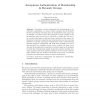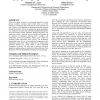78 search results - page 14 / 16 » New Public-Key Cryptosystem Using Braid Groups |
142
Voted
CEAS
2008
Springer
15 years 4 months ago
2008
Springer
The increasing use of email for phishing and unsolicited marketing has reduced the trustworthiness of email as a communication medium. Sender authentication is a known defense aga...
109
Voted
FC
1999
Springer
15 years 7 months ago
1999
Springer
Abstract. We present a series of protocols for authenticating an individual’s membership in a group without revealing that individual’s identity and without restricting how the...
132
Voted
JCS
2011
14 years 9 months ago
2011
One of the main challenges in pervasive computing is how we can establish secure communication over an untrusted high-bandwidth network without any initial knowledge or a Public K...
123
Voted
SOUPS
2009
ACM
15 years 9 months ago
2009
ACM
Social networking websites are enormously popular, but they present a number of privacy risks to their users, one of the foremost of which being that social network service provid...
127
click to vote
ASIACRYPT
2001
Springer
15 years 7 months ago
2001
Springer
In this paper we formalize the notion of a ring signature, which makes it possible to specify a set of possible signers without revealing which member actually produced the signatu...


